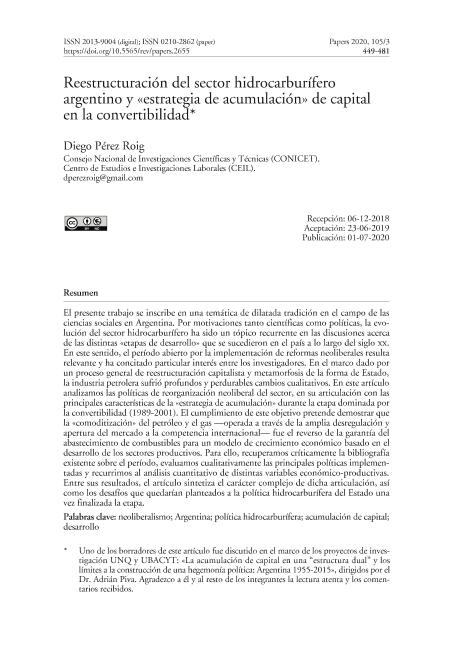Artículo
El presente trabajo se inscribe en una temática de dilatada tradición en el campo de las ciencias sociales en Argentina. Por motivaciones tanto científicas como políticas, la evolución del sector hidrocarburífero ha sido un tópico recurrente en las discusiones acerca de las distintas «etapas de desarrollo» que se sucedieron en el país a lo largo del siglo xx. En este sentido, el período abierto por la implementación de reformas neoliberales resulta relevante y ha concitado particular interés entre los investigadores. En el marco dado por un proceso general de reestructuración capitalista y metamorfosis de la forma de Estado, la industria petrolera sufrió profundos y perdurables cambios cualitativos. En este artículo analizamos las políticas de reorganización neoliberal del sector, en su articulación con las principales características de la «estrategia de acumulación» durante la etapa dominada por la convertibilidad (1989-2001). El cumplimiento de este objetivo pretende demostrar que la «comoditización» del petróleo y el gas —operada a través de la amplia desregulación y apertura del mercado a la competencia internacional— fue el reverso de la garantía del abastecimiento de combustibles para un modelo de crecimiento económico basado en el desarrollo de los sectores productivos. Para ello, recuperamos críticamente la bibliografía existente sobre el período, evaluamos cualitativamente las principales políticas implementadas y recurrimos al análisis cuantitativo de distintas variables económico-productivas. Entre sus resultados, el artículo sintetiza el carácter complejo de dicha articulación, así como los desafíos que quedarían planteados a la política hidrocarburífera del Estado una vez finalizada la etapa. This article addresses a topic with a long tradition in the field of Social Sciences in Argentina. For both scientific and political reasons, the evolution of the hydrocarbon sector has been a relevant subject in the discussion regarding the consecutive «stages of development» all along the 20th century. In this sense, the period opened by the implementation of neoliberal reforms has attracted particular interest among researchers. In the framework of a general process of capital restructuring and metamorphosis of the State, the oil industry went through deep and lasting qualitative changes. The present paper analyses the policies of neoliberal reorganization of the hydrocarbon sector, in its articulation with the main characteristics of the capital «accumulation strategy» during the stage dominated by the convertibility regime (1989-2001). Fulfilling this objective, we try to prove that the commodification of oil and gas —operated through an extensive deregulation and market opening to international competition— was the reverse of the guarantee of fuel supply for a model of economic growth based on the development of the productive sectors. In order to do this, we critically assess the existing bibliography on the period, qualitatively appraise the main policies implemented and quantitatively analyse a set of economic-productive variables. Finally, the article synthetizes the complexity of such articulation, together with the dilemmas in which State’s hydrocarbon policy would fall once the convertibility regime was over.
Reestructuración del sector hidrocarburífero argentino y «estrategia de acumulación» de capital en la convertibilidad
Título:
Restructuring of Argentine hydrocarbon sector and capital «accumulation strategy» during the convertibility regime
Fecha de publicación:
07/2020
Editorial:
Universitat Autònoma de Barcelona
Revista:
Papers
ISSN:
0210-2862
e-ISSN:
2013-9004
Idioma:
Español
Tipo de recurso:
Artículo publicado
Clasificación temática:
Resumen
Archivos asociados
Licencia
Identificadores
Colecciones
Articulos(CEIL)
Articulos de CENTRO DE ESTUDIOS E INVESTIGACIONES LABORALES
Articulos de CENTRO DE ESTUDIOS E INVESTIGACIONES LABORALES
Citación
Pérez Roig, Diego; Reestructuración del sector hidrocarburífero argentino y «estrategia de acumulación» de capital en la convertibilidad; Universitat Autònoma de Barcelona; Papers; 105; 3; 7-2020; 449-481
Compartir
Altmétricas




